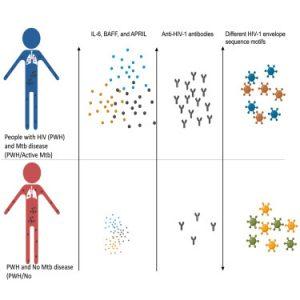A recent study revealed that individuals living with HIV, who have also experienced pulmonary tuberculosis, exhibit more extensive and powerful HIV antibody responses compared to those without any history of tuberculosis (Figure 1). Additionally, differences in HIV sequences were observed, indicating potential resistance to antibodies in the latter group. This suggests that coexisting tuberculosis has a significant impact on the immune responses of individuals with HIV and on the characteristics of the circulating HIV viruses.
Tuberculosis affects over 2 billion people worldwide, and it is the most common co-infection among individuals living with HIV. However, previous studies have not explored how tuberculosis specifically affects HIV immune responses and virus characteristics. Therefore, this study sheds light on the potential influence of tuberculosis on the effectiveness of antibody-based prevention and therapeutic strategies. Vaccines and antibodies are currently being investigated as potential treatments and cures for HIV. Nevertheless, the higher prevalence of antibody-resistant strains in individuals with tuberculosis suggests that these antibody-based interventions are more likely to fail in this particular population.
The study has significant implications for HIV vaccine strategies, particularly in the development of antibodies capable of blocking the virus after exposure. Currently, generating broad and potent HIV antibodies remains an enormous challenge. However, the study suggests that tuberculosis generates extensive and powerful antibody responses.
Journal article: Adeoye, B., et al., 2023. Mycobacterium tuberculosis disease associates with higher HIV-1-specific antibody responses. iScience.
Summary by Stefan Botha











